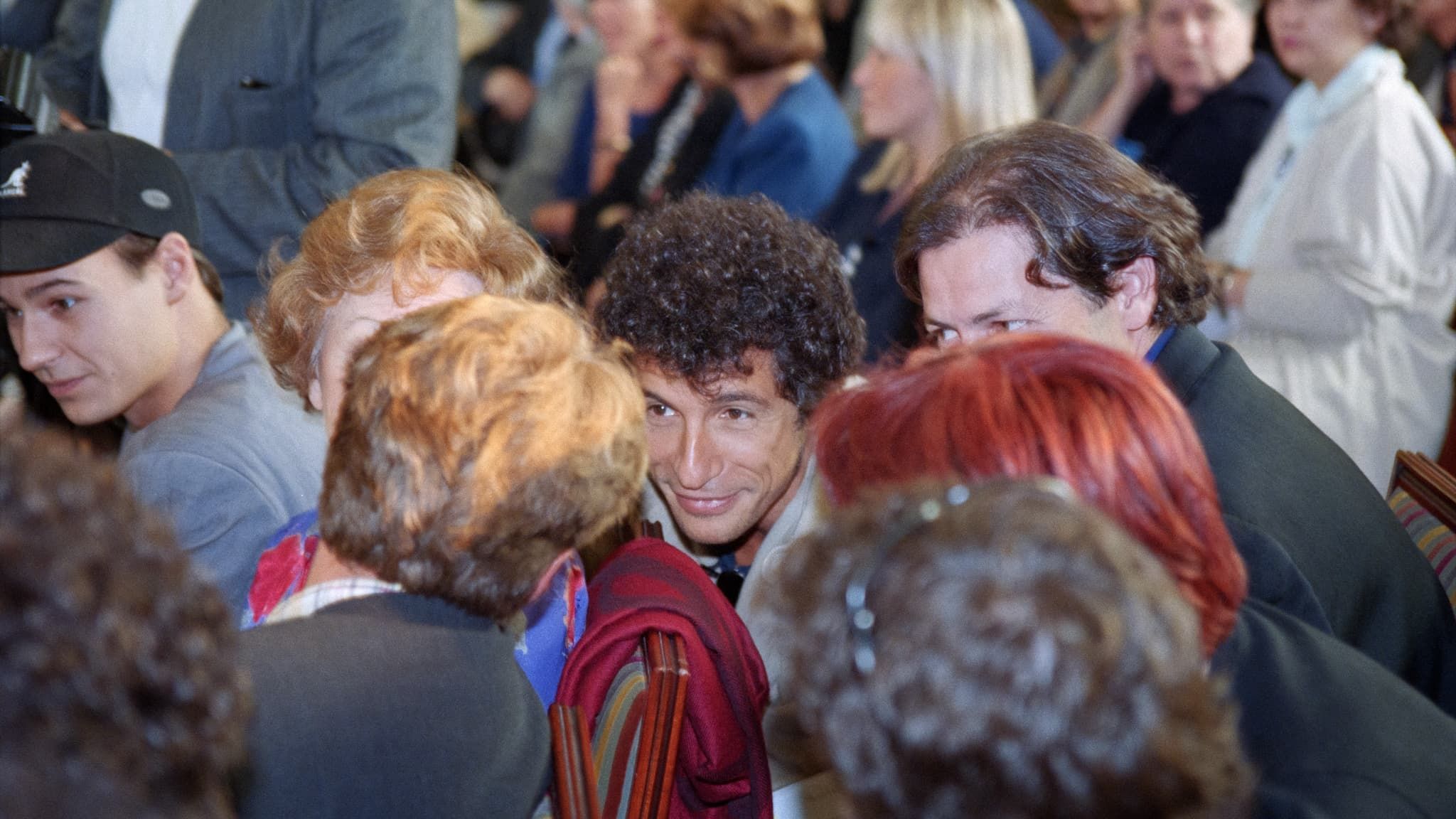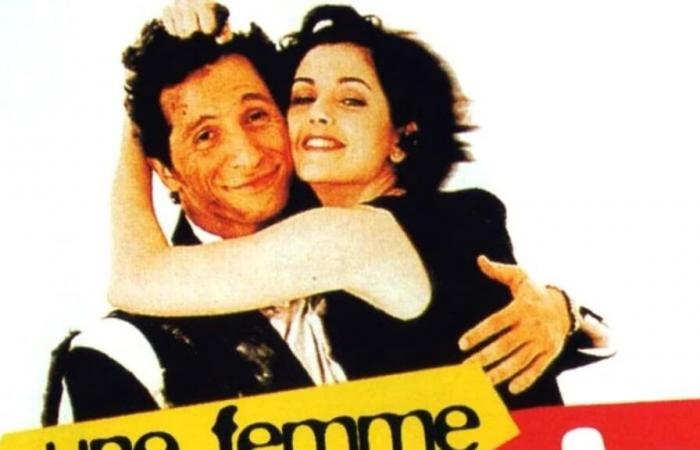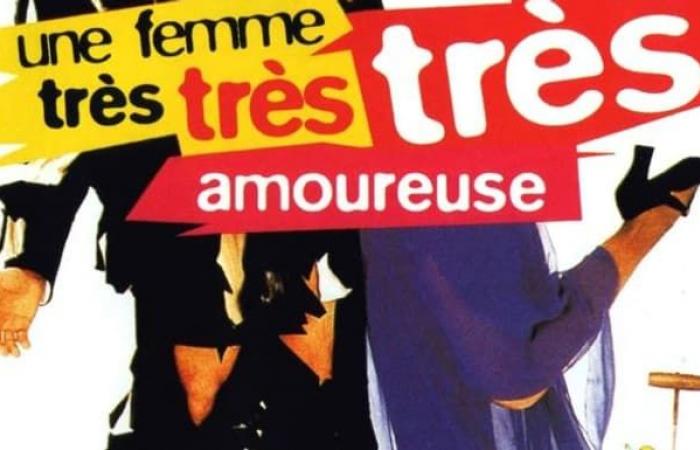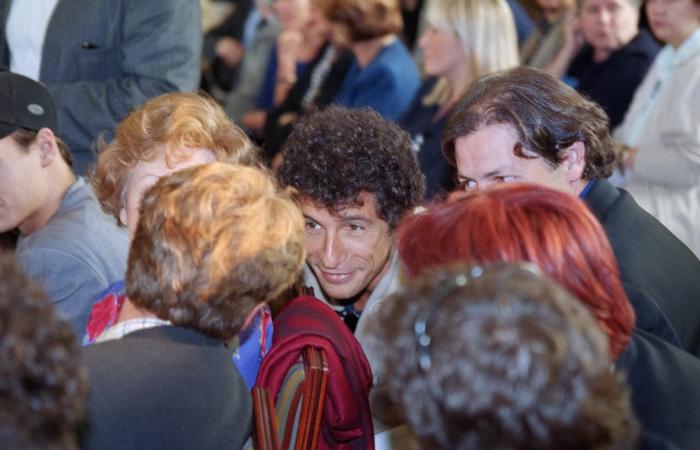Behind the scenes of French comedies (5/5) – This winter, BFMTV reveals the secrets of extraordinary, cult or unusual comedy films. Today, A very, very, very loving woman.
A star host, an effective script and crazy special effects: on paper, A very, very, very loving woman should have met with great success in theaters. But this romantic comedy with Nagui was such a failure when it was released in 1997 that this film is now completely forgotten – and even impossible to watch.
Even Nagui refuses to talk about it. In March 2017, while comedian Tom Villa discussed the film in The Earthlings on C8, embarrassment could be seen on the host’s face. A year earlier, he had confided in Le Parisien: “I dreamed of a career as an actor twenty years ago (…) Me as an actor is an insult to the likes of Vincent Cassel or Michel Bouquet.”
“I think he doesn’t want to talk about it, but I don’t know why,” Ariel Zeitoun, screenwriter and director ofA very, very, very loving woman. “He could say he hates it, but at the same time I understand very well why he doesn’t say anything (since he) has drawn a line under this period when we made the film.”
“It was catastrophic”: “A woman very, very, very in love”, the forgotten comedy with Nagui
Like any film with an atypical destiny, A very, very, very loving woman was born unexpectedly. It all started in 1993. Ariel Zeitoun released the comedy The Navel of the Worlda fresco with Michel Boujenah which lampoons the spinelessness of men and denounces the misogyny of North African countries through four portraits of women.
“I broke down a little”
Mixed success in theaters, the film was “murdered” by critics, laments the director. “When I saw women making critiques while completely missing the meaning of the film (…), in my head, I broke down a little. The other side of my feminism spoke and I said to myself that They were lying, these women.”
The director, who was inspired by a story by his mother to The Navel of the Worldthen begins to think that she had “perhaps also lied”. “All that, in my head, got a little jumbled and I said to myself that I wanted to write a film (on) lying. And that this lie would be that of the mother.”
Thus this film was born. Zak, the hero, is a comic book artist with many conquests. One day, he receives a letter written by his father on the eve of his death. There he learns that he risks being reduced to total impotence if he does not conceive a child before his next birthday.
The letter is obviously a lie to force this fickle character to lead a more orderly life. “It’s (Zak’s) mother who creates a lie,” says the director. “I think we’re being manipulated. A very, very, very loving woman wanted to tell that. It’s the manipulation of a naive boy who believes what his mother tells him.”
Dany Boon rebutted
Ariel Zeitoun does not want to make a schoolboy comedy. He wants to surprise the public with a script that mixes all genres of comedy, from Jewish humor to vaudeville. In several scenes, he goes so far as to reproduce gags from Tex Avery cartoons in live shots.
“It came quite naturally. The news Zak heard was like getting an anvil hit on the head. I thought it would be funny to see him really get an anvil hit on the head,” comments the director. “It was a way of making the attitudes and behaviors of the characters real.”
Comedies produced on French soil rarely allow themselves so much freedom. “My desire was to make a UFO”, a “smuggler’s film”, he concedes. “At the same time, a UFO is an element that has no place. So maybe I made a film that had no place.”
To carry his film, Ariel Zeitoun has an actor in mind: Dany Boon. The comedian is then at the start of his career. “I had just seen him at the Olympia. I had fallen in love with him and I said to myself that this was the actor I needed.” But France Télévisions, which finances the film, refuses to give the unknown a chance.
Hesitations
Stroke of luck: at the same time, Nagui reads the script. Ariel Zeitoun wants him to play a small role. But the host sees it as his chance to enter the world of cinema. Before him, many animators took the plunge: Jacques Martin, Guy Lux, Karl Zéro. But everyone has failed. Nagui is nevertheless convinced that the role is for him.
But some doubt the host’s potential. Ariel Zeitoun remembers a call from Jean Drucker, then general director of M6. “He said to me: ‘Nagui, are you sure? Because if you take him because he’s the greatest presenter on TV, in this case, it’s my brother Michel who you have to take, because that he is bigger than Nagui!”
Ariel Zeitoun insists: “For me, Nagui corresponded extremely well to the character who was indeed a very, very fanciful character. And Nagui is like that.” But Nagui hesitates. “It’s normal,” emphasizes Ariel Zeitoun. “I had hesitations myself too.”
But the naturalness of the host in front of the camera is reassuring. Nagui also takes lessons. He gets involved. On the set, “he would pretend to get angry or to be satisfied or dissatisfied with something. Only to see if it worked,” remembers Ariel Zeitoun. “It was both funny and a little childish, but fun.”
Worst date of the year
The filming went wonderfully despite the digital special effects, which were in their infancy at the time, which made the process a little more cumbersome. But they are essential to bring the delusions of Nagui’s character to life. “It was a huge mess on set,” laughs Ariel Zeitoun. “It was time-consuming, not fun.”

It’s as the release approaches that everything goes wrong. The film does not please distributors. After almost 9 months of waiting, it finds itself scheduled in the middle of summer, on August 13. “They tell me, it’s not good, that no one is laughing. When they’re not keen on a film, they release it on lousy dates so they can quickly remove it from theaters.”
Failure seems inevitable. Especially since the reviews are catastrophic – with the exception of that of Le Monde. Jacques Mandelbaum sees it as a “slightly cheeky” and “seductive” film. The critic also praises the “quite tasty” performance of Thomas Langmann, who appears in the film as an ultra-orthodox and sex-obsessed rabbi.
“She was not at all mean or aggressive, but rather even quite understanding. Maybe it’s summer that does that. When it’s summer, they soften,” laughs Ariel Zeitoun .
“A real blow to the head”
Nagui is fully involved in promotion. “He was very supportive,” greets Ariel Zeitoun. Two months before the release, during the cinema festival in June, he participated in several previews. “It was full. There was absolutely crazy enthusiasm, but it was for Nagui, as a person.”
In the theaters, there is no enthusiasm. Only 47,808 people are traveling. “It’s a real blow to the head,” summarizes Ariel Zeitoun. “We had a feeling of injustice.” In the middle of summer, it’s impossible to promote on television with Nagui. “It was absurd. He did a (promotional) show when the film was no longer in theaters!”
“When we learned of the entries on the first day, we didn’t know what to say. We knew that the film was going to be pulled from theaters the following week. It was catastrophic. It was several years that were turning into dust. just one shot. It’s very difficult to live with, but that’s how it is, we were wrong,” laments Ariel Zeitoun.
“Cinema Pollution”
How to explain this failure? 1997 was a dark year for Nagui. Several of his shows including Taratata are canceled due to lack of audience. He is also caught in the turmoil of the presenter-producer affair with France 2.
For Ariel Zeitoun, the failure of the film has nothing to do with Nagui’s setbacks. “Maybe people didn’t expect to see Nagui play a leading role in a film and they thought it was a commercial operation. We didn’t say to ourselves that we were taking him on as a hit. On the contrary, it was a risk!”
Broadcast at the end of the 1990s on Canal +, France 2 and M6, the film found a second lease of life on TV. “What I know is that the program directors, in particular that of France Télévisions, had spoken to Nagui about it and told him (that we) were around 20, 22% (of audience), which was not bad,” explains Ariel Zeitoun.
Then the film disappeared. Only available on VHS, it has never been released on DVD and is not available for streaming. Even on Allociné, the film is completely ignored. The site only lists two – murderous – reviews from spectators. The first speaks of “cinematographic pollution”, the second believes that “Nagui manages to drag Boujenah down”.
A release soon?
Despite this failure, Ariel Zeitoun has no regrets. He remains proud of his film. “Obviously, I said to myself that there are lots of things that could have been better, but at the same time, I said to myself that it was rather inflated. The story is funny, crazy and tells a lot of things that ‘We couldn’t do it today on male/female relationships. I don’t regret having done it at all.’
The director hopes to resurrect his film. He took over his rights to remaster it and release it “next year”. “EuropaCorp is going to take on the mandate for the film to sell it to TV, to try to revive it or live it up a little. I’ve seen worse on television so I hope we’ll find slots.”








